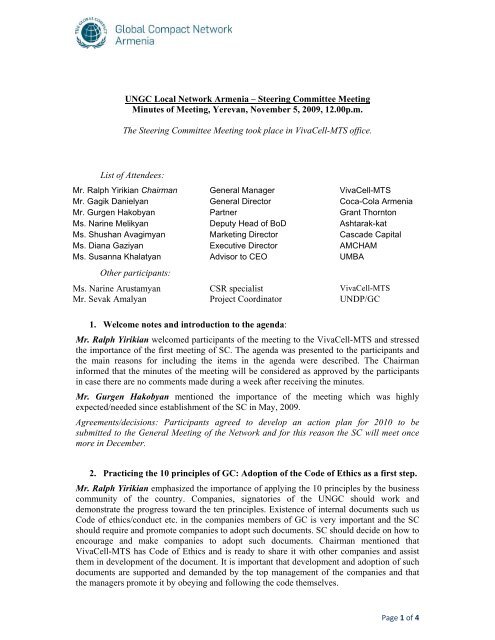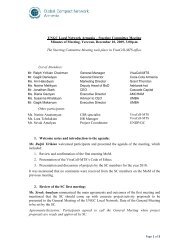UNGC Local Network Armenia – Steering Committee Meeting ...
UNGC Local Network Armenia – Steering Committee Meeting ...
UNGC Local Network Armenia – Steering Committee Meeting ...
Create successful ePaper yourself
Turn your PDF publications into a flip-book with our unique Google optimized e-Paper software.
<strong>UNGC</strong> <strong>Local</strong> <strong>Network</strong> <strong>Armenia</strong> <strong>–</strong> <strong>Steering</strong> <strong>Committee</strong> <strong>Meeting</strong><br />
Minutes of <strong>Meeting</strong>, Yerevan, November 5, 2009, 12.00p.m.<br />
The <strong>Steering</strong> <strong>Committee</strong> <strong>Meeting</strong> took place in VivaCell-MTS office.<br />
List of Attendees:<br />
Mr. Ralph Yirikian Chairman General Manager VivaCell-MTS<br />
Mr. Gagik Danielyan General Director Coca-Cola <strong>Armenia</strong><br />
Mr. Gurgen Hakobyan Partner Grant Thornton<br />
Ms. Narine Melikyan Deputy Head of BoD Ashtarak-kat<br />
Ms. Shushan Avagimyan Marketing Director Cascade Capital<br />
Ms. Diana Gaziyan Executive Director AMCHAM<br />
Ms. Susanna Khalatyan Advisor to CEO UMBA<br />
Other participants:<br />
Ms. Narine Arustamyan CSR specialist VivaCell-MTS<br />
Mr. Sevak Amalyan Project Coordinator UNDP/GC<br />
1. Welcome notes and introduction to the agenda:<br />
Mr. Ralph Yirikian welcomed participants of the meeting to the VivaCell-MTS and stressed<br />
the importance of the first meeting of SC. The agenda was presented to the participants and<br />
the main reasons for including the items in the agenda were described. The Chairman<br />
informed that the minutes of the meeting will be considered as approved by the participants<br />
in case there are no comments made during a week after receiving the minutes.<br />
Mr. Gurgen Hakobyan mentioned the importance of the meeting which was highly<br />
expected/needed since establishment of the SC in May, 2009.<br />
Agreements/decisions: Participants agreed to develop an action plan for 2010 to be<br />
submitted to the General <strong>Meeting</strong> of the <strong>Network</strong> and for this reason the SC will meet once<br />
more in December.<br />
2. Practicing the 10 principles of GC: Adoption of the Code of Ethics as a first step.<br />
Mr. Ralph Yirikian emphasized the importance of applying the 10 principles by the business<br />
community of the country. Companies, signatories of the <strong>UNGC</strong> should work and<br />
demonstrate the progress toward the ten principles. Existence of internal documents such us<br />
Code of ethics/conduct etc. in the companies members of GC is very important and the SC<br />
should require and promote companies to adopt such documents. SC should decide on how to<br />
encourage and make companies to adopt such documents. Chairman mentioned that<br />
VivaCell-MTS has Code of Ethics and is ready to share it with other companies and assist<br />
them in development of the document. It is important that development and adoption of such<br />
documents are supported and demanded by the top management of the companies and that<br />
the managers promote it by obeying and following the code themselves.<br />
Page 1 of 4
Ms. Narine Melikyan mentioned that Ashtarak-kat Company has the Code of Ethics adopted<br />
since 2006 and that document stresses the values the company believes in and strives for. The<br />
document as well as other internal documents of the company is available on the official<br />
website of the company. Also important, the company organized special trainings for the staff<br />
on the mentioned documents to make sure that each employee is well aware and able to apply<br />
the Corporate Values. Nevertheless, a lot has to be done yet and the management of the<br />
company is the primary responsible for that. There are difficulties, moments of<br />
discouragement, however, the only way to overcome these is for the management to apply<br />
and obey the rules on their own and serve as an example for all the others.<br />
Mr. Gagik Danielyan added that usually companies/employees are resistant to changes and<br />
change is really hard to make happen. Management should be the first to show the<br />
importance of the changes and the benefit it can bring to the company and the employees on<br />
own example. The Coca Cola company has the Code of Business Conduct adopted in the<br />
company along with other internal procedures and regulations. The company is ready to share<br />
the documents and its experience with others. Mr. Danielyan rejected the opinion that there is<br />
something unique in <strong>Armenia</strong>n reality and that it is difficult to introduce mentioned changes<br />
in our country mentioning that everything depends on the commitment of the management of<br />
the given company.<br />
Mr. Gurgen Hakobyan said that the case of GTA is different because as an audit company<br />
working in a strongly regulated field they were supposed to have all kind of regulatory<br />
documents in place and moreover, being a part of international organization all the required<br />
documents were adopted from the very beginning. Introduction and adoption of the<br />
documents was easy in GTA as there are only qualified and educated people working in the<br />
company who are open and they do understand the importance of corporate policies etc. The<br />
most important thing for an audit/consulting company is to create the demand and require<br />
client companies to apply effective internal regulations trough adoption of different kinds of<br />
documents and for this reason the audit should itself have an effective regulatory system<br />
within the company.<br />
Ms. Susanna Khalatyan mentioned that UMBA fully understands the importance of such<br />
documents and have tried several times to request companies to develop and adopt them.<br />
However, the reaction of the companies, members of UMBA was mainly negative and the<br />
prevailing opinion is that it is not the time and it is not that important/urgent for companies to<br />
deal with the issue.<br />
Agreements/decisions: Participants agreed that the members of the SC as well as other<br />
companies in the network should be an example for others and for this reason these<br />
companies should join their efforts in practicing more CSR through concrete actions/projects<br />
and then only demand/require other companies to act similarly.<br />
3. Raising the staff awareness and revising the strategy according to <strong>UNGC</strong><br />
principles.<br />
Mr. Ralph Yirikian mentioned that the GC member companies should be required to show<br />
the concrete steps toward raising the employees’ awareness on CSR/GC and make the<br />
necessary corrections in their business strategies to comply with the 10 principles of GC. This<br />
all should be started from simple things such as improving the working<br />
conditions/environment for the employees. The employees are ambassadors of the companies<br />
Page 2 of 4
to the society and the messages they bring to the society are crucial. In response to the<br />
concern that the crisis is not the right time for making such changes the Chairman brought the<br />
example of VivaCell-MTS for which the crisis became a chance for optimization and<br />
introduction of radical changes in the way the business is done. The reaction to the crisis<br />
should make sure that the company gets a competitive advantage when the crisis is over.<br />
Companies as well as the society in large should learn and be open to novelties, new<br />
mentality, approaches and reality. VivaCell-MTS has simple examples of how internally the<br />
business can be changed in response to new realities <strong>–</strong> procurement of recycled paper only,<br />
encouraging and supporting volunteerism among the employees are the examples.<br />
Ms. Diana Gaziyan stressed that there is no culture of giving among the <strong>Armenia</strong>n business<br />
community and it can be reached through showing that the companies can benefit and gain<br />
competitive advantage by creating positive image in the market. For example people in<br />
<strong>Armenia</strong> prefer VivaCell-MTS for their socially responsible image and they become clients<br />
of the company regardless of the quantity of the advertisement and tariffs offered by the<br />
competitors in the market.<br />
Agreements/decisions: Participants agreed to develop concrete plan of actions and decide on<br />
strategic directions for initiating concrete projects to be implemented by the GC network in<br />
<strong>Armenia</strong>.<br />
4. External CSR investments <strong>–</strong> selection of fields of interest.<br />
Mr. Ralph Yirikian mentioned that as a part of activities for 2010 the <strong>Network</strong> should<br />
implement concrete projects in one of the fields of environment, education or science<br />
depending on the decision of the SC. The companies are not expected to support and<br />
contribute to the projects equally but rather according to their size and financial capacities.<br />
In regard to the government’s role in promoting CSR the Chairman mentioned that of course<br />
the state has a role to play however, we can’t wait and should not expect too much. The GC<br />
in <strong>Armenia</strong> can trigger the government’s actions by its own effective and rapid actions.<br />
Mr. Gurgen Hakobyan said that the education is the priority for GTA and that is the field<br />
where the company is mainly practicing its CSR activities. To educate and demand that is<br />
what an audit/consulting company can do. Currently CSR is not even included in the<br />
curriculum of our universities and not surprisingly people have no idea of CSR. There can be<br />
different formats and approaches for reaching people with the ideas. In addition, there should<br />
be created a demand for CSR in the country and all the stakeholders and especially the<br />
government has an important role to play here. GTA is ready to support and work for creating<br />
the demand for CSR in <strong>Armenia</strong> particularly working with the government.<br />
Ms. Diana Gaziyan raised the issues of involving the government in the works of the<br />
<strong>Network</strong> and especially of the SC. Creating public policy on CSR is the primary duty of the<br />
government and the GC in <strong>Armenia</strong> should promote this idea.<br />
Agreements/decisions:<br />
- Participants voted for all the three proposed fields/directions for implementation of<br />
concrete projects. By the suggestion of the chairman the healthcare was also included in<br />
the list of priorities.<br />
- It was decided to bring other stakeholders and companies to the room and organize<br />
wider discussions on CSR, which will help spreading the idea among wider audience.<br />
Proposed by the UMBA representative it was decided to organize series of meetings with<br />
Page 3 of 4
usinesses members of UMBA where SC members will share their experience of<br />
practicing CSR and disseminate the idea of CSR at the same time.<br />
- The participants agreed to discuss further the proposal by GTA for a collective action by<br />
the GC members on cutting the companies’ budgets on seasonal greeting cards/presents<br />
and spend the budgets on the projects to be selected by the SC.<br />
- The participants decided to propose concrete projects for the next meeting of SC to<br />
discuss and select projects to be implemented. The selected projects will be submitted to<br />
the General <strong>Meeting</strong> of the GC meeting in December.<br />
- It was decided to hold the next meeting of the SC on December 10, 2009 at 12.00pm in<br />
VivaCell-MTS office.<br />
Page 4 of 4



